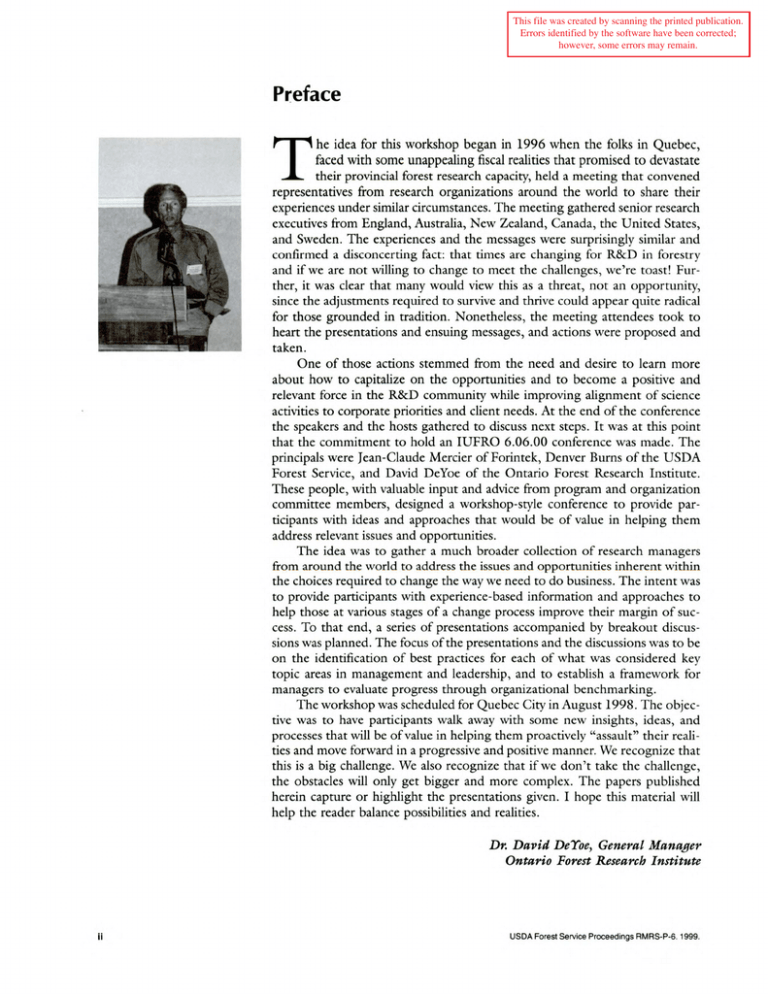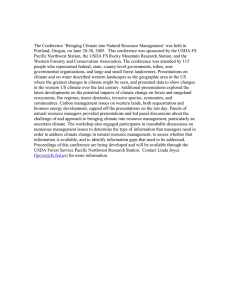T Pr:eface he idea for this workshop ...
advertisement

This file was created by scanning the printed publication. Errors identified by the software have been corrected; however, some errors may remain. Pr:eface Preface The idea for this workshop began in 1996 when the folks in Quebec, T he idea for this workshop began in 1996 when the folks in Quebec, faced with some unappealing fiscal realities that promised to devastate their provincial forest research capacity, held a meeting that convened representatives from research organizations around the world to share their experiences under similar circumstances. The meeting gathered senior research executives from England, Australia, New Zealand, Canada, the United States, and Sweden. The experiences and the messages were surprisingly similar and confirmed a disconcerting fact: that times are changing for R&D in forestry and if we are not willing to change to meet the challenges, we're toast! Further, it was clear that many would view this as a threat, not an opportunity, since the adjustments required to survive and thrive could appear quite radical for those grounded in tradition. Nonetheless, the meeting attendees took to heart the presentations and ensuing messages, and actions were proposed and taken . One of those actions stemmed from the need and desire to learn more about how to capitalize on the opportunities and to become a positive and relevant force in the R&D community while improving alignment of science activities to corporate priorities and client needs. At the end of the conference the speakers and the hosts gathered to discuss next steps. It was at this point that the commitment to hold an IUFRO 6.06.00 conference was made . The principals were Jean-Claude Mercier ofForintek, Denver Burns of the USDA Forest Service, and David DeYoe of the Ontario Forest Research Institute. These people, with valuable input and advice from program and organization committee members, designed a workshop-style conference to provide participants with ideas and approaches that would be of value in helping them address relevant issues and opportunities. The idea was to gather a much broader collection of research managers from around the world to address the issues and opportunities inherent within the choices required to change the way we need to do business. The intent was to provide participants with experience-based information and approaches to help those at various stages of a change process improve their margin of success. To that end, a series of presentations accompanied by breakout discussions was planned. The focus of the presentations and the discussions was to be on the identification of best practices for each of what was considered key topic areas in management and leadership, and to establish a framework for managers to evaluate progress through organizational benchmarking. The workshop was scheduled for Quebec City in August 1998. The objective was to have participants walk away with some new insights, ideas, and processes that will be of value in helping them proactively "assault" their realities and move forward in a progressive and positive manner. We recognize that this is a big challenge. We also recognize that ifwe don't take the challenge, the obstacles will only get bigger and more complex. The papers published herein capture or highlight the presentations given. I hope this material will help the reader balance possibilities and realities. faced with some unappealing fiscal realities that promised to devastate their provincial forest research capacity, held a meeting that convened representatives from research organizations around the world to share their experiences under similar circumstances. The meeting gathered senior research executives from England, Australia, New Zealand, Canada, the United States, and Sweden. The experiences and the messages were surprisingly similar and confirmed a disconcerting fact: that times are changing for R&D in forestry and if we are not willing to change to meet the challenges, we're toast! Fur- ther, it was clear that many would view this as a threat, not an opportunity, since the adjustments required to survive and thrive could appear quite radical for those grounded in tradition. Nonetheless, the meeting attendees took to heart the presentations and ensuing messages, and actions were proposed and taken. One of those actions stemmed from the need and desire to learn more about how to capitalize on the opportunities and to become a positive and relevant force in the R&D community while improving alignment of science activities to corporate priorities and client needs. At the end of the conference the speakers and the hosts gathered to discuss next steps. It was at this point that the commitment to hold an IUFRO 6.06.00 conference was made. The principals were Jean-Claude Mercier of Forintek, Denver Burns of the USDA Forest Service, and David DeYoe of the Ontario Forest Research Institute. These people, with valuable input and advice from program and organization committee members, designed a workshop-style conference to provide par- ticipants with ideas and approaches that would be of value in helping them address relevant issues and opportunities. The idea was to gather a much broader collection of research managers from around the world to address the issues and opportunities inherent within the choices required to change the way we need to do business. The intent was to provide participants with experience-based information and approaches to help those at various stages of a change process improve their margin of suc- cess. To that end, a series of presentations accompanied by breakout discus- sions was planned. The focus of the presentations and the discussions was to be on the identification of best practices for each of what was considered key topic areas in management and leadership, and to establish a framework for managers to evaluate progress through organizational benchmarking. The workshop was scheduled for Quebec City in August 1998. The objec- tive was to have participants walk away with some new insights, ideas, and processes that will be of value in helping them proactively "assault" their reali- ties and move forward in a progressive and positive manner. We recognize that this is a big challenge. We also recognize that if we don't take the challenge, the obstacles will only get bigger and more complex. The papers published herein capture or highlight the presentations given. I hope this material will help the reader balance possibilities and realities. Dr. David DeYoe, General Manager Ontario Forest Research Institute USDA Forest Service Proceedings RMRS-P-6. 1999. Dr. David DeYoe, General Manager Ontario Forest Research Institute ii USDA Forest Service Proceedings RMRS-P-6. 1999. Workshop Purpose • To develop organizational networks to help achieve best practices in management and leadership of forest research and foster continuous learning toward that goal through organizational benchmarking. Objectives • To facilitate the development of best practice standards for management and leadership of forest research, both within and across organizations. • To establish a process for benchmarking current or planned practices against a collection of standards that are effective, relevant, flexible, and viable. Desired Outcomes • To inform research managers of management and leadership strategies that work. • To provide managers with an expanded network of colleagues with whom they can confer on what works, what doesn't, and why. • To ensure participants walk away with at least one revelation or practice that will help them resolve an issue of concern. USDA Forest Service Proceedings RMRS-P-6. 1999. iii

